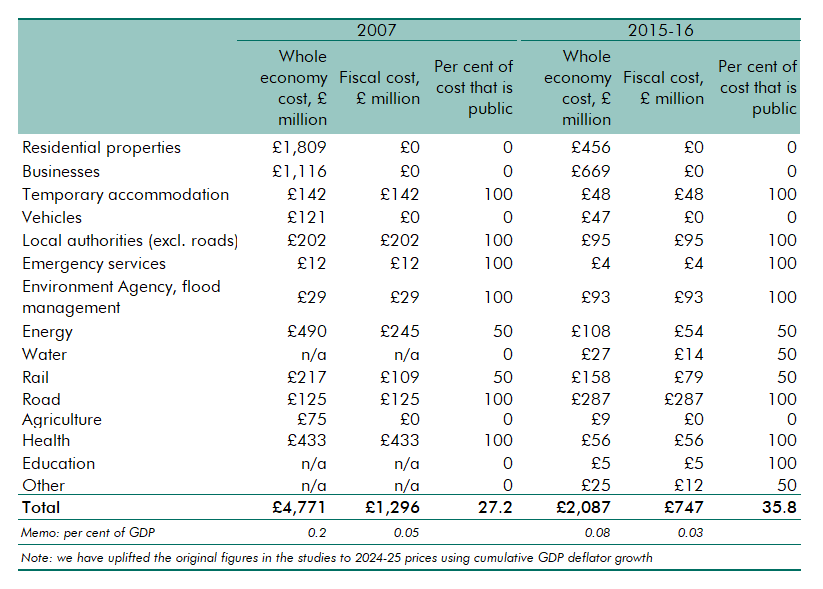In 2010 and 2018, Defra and the Environment Agency produced reports exploring the costs of the 2007 summer floods and 2015-16 winter floods to the UK economy. In this box we used these numbers to estimate the direct fiscal costs of these flood events.
This box is based on Defra and Environment Agency data from January 2010 and January 2018 .
In June and July 2007, exceptional rainfall caused extensive flooding across the UK, especially in South and East Yorkshire, Worcestershire, Gloucestershire and Oxfordshire, though areas of Wales, Scotland and Northern Ireland were also affected.a The Met Office stated that, at the time, it was the wettest summer on record, with 414.1mm of rain falling across England and Wales between May and July, more than any other time since records began in 1766.b In 2015- 16, serious floods again resulted from a series of heavy rainfall events from 11 named storms that hit Great Britain and Ireland between November 2015 and March 2016. Cumulatively the storms produced record rainfall in both monthly and seasonal accumulation records, with the most significant of these (Storms Desmond, Eva and Frank) impacting Cumbria, West Yorkshire and Lancashire, and North West Scotland the most severely.
Defra and the Environment Agency estimated that the 2007 summer floods cost the UK economy £3.2 billion, while the 2015-16 winter floods cost the economy roughly half of that (£1.6 billion). There are similarities in both floods as to where the major costs fell, as well as some discrepancies, as shown in Table A. For both, the two largest costs to the economy were to residential housing and businesses, although residential housing was a significantly higher cost in the 2007 floods, representing nearly 40 per cent of the total cost, whereas business felt the brunt in the 2015-16 floods at about a third of the costs. These costs we assume fall largely to the private sector. Communication and utilities also experienced large costs in both events. We would assume much of these sectoral costs would fall to the state. However, there is a large difference in costs to the health sector, which made up nearly 10 per cent of the 2007 total costs, but only 2.7 per cent of the 2015-16 floods (and which we assume fall entirely to the public sector). These differences could reflect that the 2007 floods impacted a more populous region of the UK’s geography in the southwest of England, as opposed to less populated areas such as North West Scotland.
Based on the more recent of the two studies, we estimate the direct fiscal cost of flooding to be around 36 per cent of the total economic cost. We have assumed that the total reported £4.8 billion in 2024-25 prices (0.2 per cent of GDP) economic cost of the 2007 floods is split into:
- £0.9 billion worth of costs to public infrastructure and public health which would fall wholly to the public sector;
- a further £0.7 billion worth of costs in sectors such as energy, water, and rail where the government would pay around half of costs; and
- £3.1 billion in private costs from damage to residential properties, businesses, and vehicles.
This gives an estimated direct fiscal cost of £1.3 billion (0.1 per cent of GDP) for the 2007 floods. Performing a similar exercise for the (less severe) 2015-16 floods results in economic costs of £2.1 billion in 2024-25 prices (0.1 per cent of GDP). Of these costs, there is:
- £0.6 billion worth of costs to public infrastructure and public health which would fall wholly to the public sector;
- a further £0.3 billion worth of costs in sectors such as energy, water, and rail where the government would pay around half of costs; and
- £1.2 billion in private costs from damage to residential properties, businesses, and vehicles.
This results in an estimated direct fiscal cost of £0.7 billion (0.03 per cent of GDP).
Table A: The economic costs of the 2007 and 2015 floods in England

This box was originally published in Fiscal risks and sustainability – September 2024
